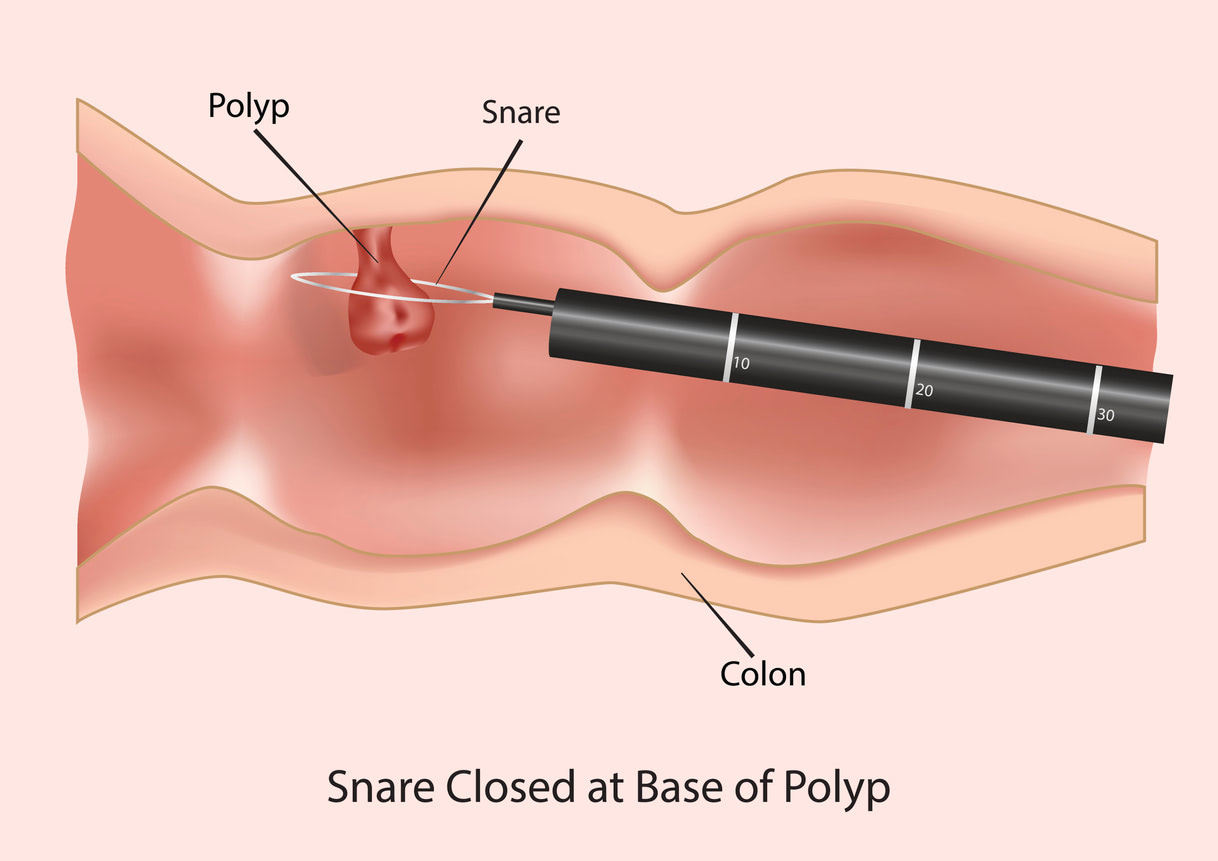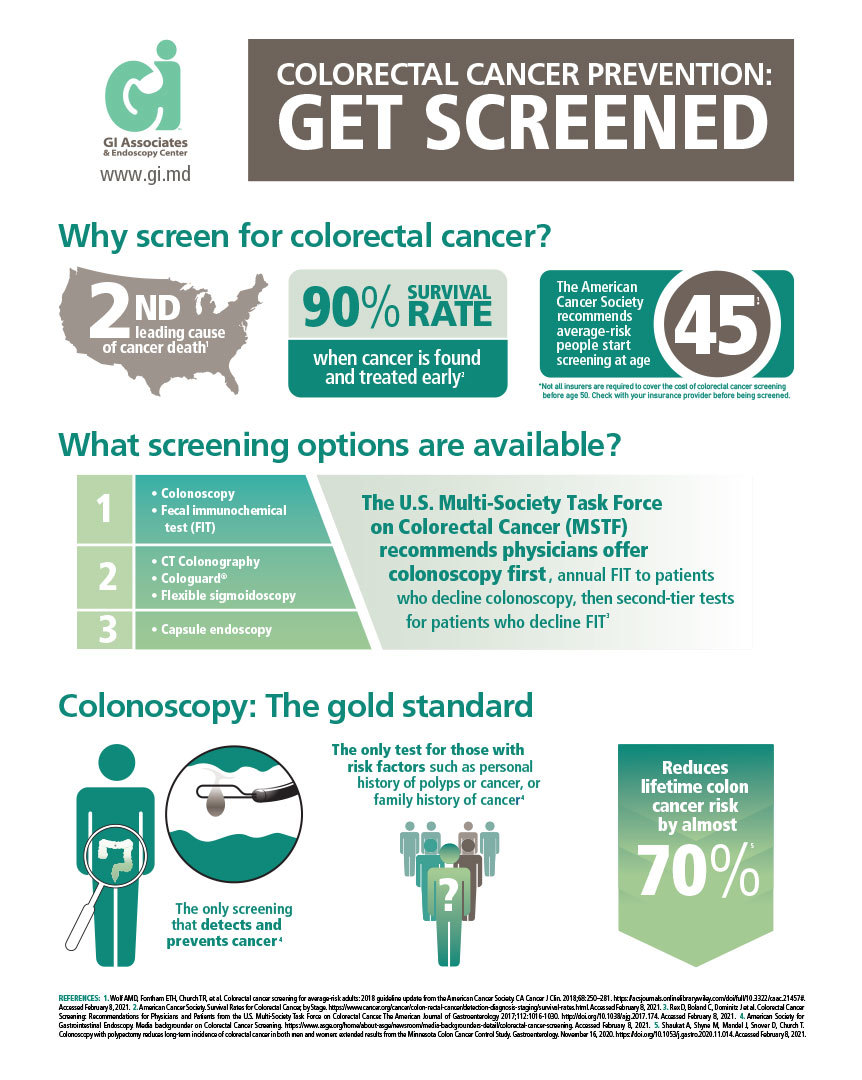We get it - most people aren’t going to get excited about a colonoscopy. After all, the general description of the exam doesn’t sound very appealing and preparing for a colonoscopy can certainly cause a little bit of anxiety. But here at GI Associates, a colonoscopy is one life-saving exam that we can really get excited about.
Whether it’s a week before your test or you’re having your colonoscopy the next day, it’s perfectly normal to feel a little nervous. However, knowledge is power—and knowing exactly how to prepare for your colonoscopy exam can help give you some relief before, during, and after your test. Read on to learn about the dos and don’ts of preparing for colonoscopy and the steps you should take to prepare you for the procedure.
What Is Colonoscopy and Why Is It Important?
Colonoscopy is the gold standard for colon cancer screenings. In 2018, the American Cancer Society lowered the guidelines for first colonoscopy from age 50 to 45 for both women and men. However, many patients are still wary of the procedure because of the preparation involved. One of the reasons that colonoscopy is the gold standard is because not only can it detect colorectal cancer and cancerous polyps, your physician can also remove the polyps during the procedure, making this the one test that can detect and remove cancer on the same day.

With the statistics of colon cancer rising, it’s imperative to schedule your first colonoscopy on time. It’s also a good idea to talk to your GI doctor or primary care physician about your family history long before you schedule your first colonoscopy. Those with a family history of colon cancer or those with a history of inherited syndromes, such as Lynch syndrome, should likely be tested even before the age of 45. Early detection is key, and colonoscopy is vital.

In order to perform the procedure, the colon needs to be empty. While the colonoscope can remove polyps, fundamentally speaking, a colonoscopy is an imaging study that gives the physician a clear view of your colon. Thus, he or she needs to be able to see the colon clearly. To accomplish this, you’ll go through a routine of both using laxatives and fasting prior to your procedure.
More About General Colonoscopy Prep
Once you schedule the procedure, your doctor will give you clear instructions on how to prepare. If you have any questions about the procedure, your doctor is the best avenue of communication. Keep in mind that the day before your procedure, you should clear your schedule. It does take adequate time to prepare beforehand. You should also have a friend or family member accompany you to the procedure, not only for support but to drive you home afterward. Before your procedure, you’ll want to head to the grocery store to stock up on supplies you’ll need during the recovery time. Make sure you have plenty of clear broth, Jell-O or gelatin, sports drinks, juice, and other clear liquids. For comfort, you may also want to have baby wipes on hand as well as zinc oxide-based diaper rash cream, just to soothe any discomfort you may have. Your doctor will also likely prescribe a laxative or direct you to a certain over-the-counter brand.
Avoiding Certain Foods, Stopping Iron Supplements, and Other Do’s and Don’ts
For most healthy adults, colonoscopy prep just covers the 48 hours prior to the procedure. In some cases, your doctor may want you to begin even earlier. Following your doctor’s orders is the most important part of the prep. If you are advised to begin several weeks before your colonoscopy procedure, there are certain things to think about, foods to avoid, and other issues you should discuss with your doctor. The medications you currently take are vitally important when it comes to information you should tell your doctor. If you are on any type of anticoagulant (blood thinner), you should inform your doctor immediately. Certain blood thinners include Plavix, heparin, and warfarin, although there are many others. More than likely, your doctor will advise you to discontinue the medication until the procedure is complete, but always check to make sure.
Other medications that may interfere with a colonoscopy include medications for diabetes. Your doctor may want to lower the insulin dosage before the procedure. If you take other diabetes medications, such as metformin or medication that contains metformin, you should not take it the day before your colonoscopy.
If you have an automatic implantable cardioverter-defibrillator (AICD), let your doctor know immediately. In this case, you will need a letter of clearance from your cardiologist before your colonoscopy is performed.
Colonoscopy prep also requires avoiding certain foods. You may also want to discontinue specific vitamins or supplements that you take, so inform your doctor of everything you take on a daily basis, even if it seems minuscule or is an over-the-counter medication. As far as foods go, it’s a good idea to stick to low-fiber foods, avoiding whole grains, tough meat, whole foods, and raw vegetables, corn, fruits with peel or seeds, and seeds or nuts.
One Week Before Your Procedure
It is important to think about colonoscopy prep up to a week before your procedure. Although you may have been starting to avoid certain foods prior to this point, this is when you should concentrate on only eating low-fiber foods. Think of things that will be easy to pass during the actual prep time. This includes foods such as:
- Cooked vegetables with no skin
- White rice, bread, and pasta
- Eggs
- Lean meat, chicken, or fish
- Fruit with no seeds or skin
This is also at the point where your doctor may advise you to stop taking certain medications. While insulin and blood-thinning medications are the most important to mention, your physician may also advise the cessation of nonsteroidal anti-inflammatory drugs (NSAIDs), such as ibuprofen.
When it becomes closer to your procedure, such as two days before, make sure that you are drinking plenty of water and other clear liquids. This will simply make the procedure easier for you and help you to avoid dehydration. At this point, your doctor may also recommend not eating foods that are red or orange in color, as this can cause the colon to look inflamed during the test because of discoloration.
The Day Before Your Procedure
The day before your procedure, it’s imperative to direct all of your attention to your colonoscopy prep. This is the point at which you can no longer eat solid foods, and must be on a clear liquid diet. Stock up on clear broth, Jell-O, popsicles, sports drinks, and coffee or tea. Remember to add no creamer to your coffee or tea the day before, however. If you have any questions about what food or drink is considered a clear liquid, ask your doctor before you ingest it. It’s essential to be on the safe side.
The day before, you will also be concentrating on cleaning out your colon in most cases. Many doctors will give you a solution the night before and the day of the colonoscopy, to ensure that you clean out the colon and go to the bathroom regularly. These bowel movements can be sudden and will turn into diarrhea, so do not make any other plans.
However, GI Associates offers an alternative tool that is more comfortable to help clean out your colon. Known as HyGIeaCare, this FDA-approved procedure is typically more comfortable for patients. Instead of drinking laxatives, the day of your procedure, you would arrive at our office (as we are a certified HyGIeaCare Center). A thin nozzle is inserted into the rectum, and warm water is used to clean out the colon gently. This procedure has been found to help patients feel more comfortable both before and after the procedure.
Colonoscopy Recovery Time
Immediately after your procedure, your IV is removed, and nurses and doctors will continue to monitor you for a little while. Make sure you do have someone to take you home. Generally speaking, you can return to normal activity after 24 hours. Do not drink alcohol in the first 24 hours after your procedure. You can begin to eat light foods again immediately after the procedure, although you may feel more comfortable on a liquid diet for one more day as your stomach settles. If you had a biopsy during the procedure or polyps removed, you might see some bleeding afterward—this is completely normal.
If you need more information on colonoscopy prep or would like to schedule a colonoscopy procedure, book an appointment at GI Associates and Endoscopy Center today. We offer three separate locations for your convenience and the highest level of care to help keep you comfortable and relaxed at all times.
